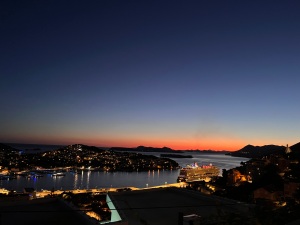All throughout the summer of 1939 people in France sipped coffees in outdoor cafés. They did the same in Italy.
In England, people ordered tea. In Germany, couples got engaged and married and attended baptisms and weddings. The beer, flowed and life was pretty good. Some of the well-heeled Jews in Poland sipped their cognac from led crystal while their children played classical music in the sitting room. All of that normal life was happening until September when the world fell apart. Then it was World War Two, and then it was over.
It’s now June 2024. I just retired in January. We got invited to join several other couples on a sailboat for a week around some of the islands of the Adriatic off of the coast of Croatia. It was the chance of a lifetime so we jumped on it.
Making the big trip to Europe gave us the opportunity to make the most of it. We chose as our first destination London. Though I’ve landed there en route to elsewhere, I’ve never been outside of the airport, so we took the occasion to walk downtown. Then we headed up to have a glimpse of Edinburgh, Scotland before flying down to Dubrovnik for a few days before the sailing trip.
I’m sitting on a balcony overlooking to Dubrovnik Harbor. It’s sunset. I’ve got some nice wine here and we’ve had a wonderful day sightseeing and having morning coffee and afternoon beer in beautiful places. And we keep wondering if all this is happening in a time similar to the summer of 1939 just before the world falls apart.
Why? The war in Ukraine keeps ratcheting up our involvement and NATO’s response. Russia’s reply of saber-rattling is both ominous and predictable. China has allied itself with Putin’s regime. Then there is the genocide in Gaza, which is drawing Lebanon, and, by implication, Iran closer to all-out war with Israel.
Here in Europe, our NATO ally Hungary, under Orban, signed a deal with Russia to build two of their nuclear reactors in Hungary. Orban is also angling to get out of their NATO obligations to support Ukraine. Almost anything could happen. This could be our 1939.
But we don’t know that any more than the people in the cafes in 1939 did. So we enjoy the views, sip the wines, and hope for the best, with gnawing awareness that the gloom clouds are darkening.
Soon we will join some friends who have chartered a catamaran sailboat to see some of the islands off the Croatian coast. The islands typically have beautiful old towns with narrow streets of slick, ancient stone, and centuries-old buildings. Greeks were here, Venetians, and Romans, before the current Slavs. Civilizations come and go. Sobering thought.
After the Adriatic, we will head to Paris for a couple of days. They are gearing up to host the Olympics, just as Sarajevo did back in more innocent days. I visited Sarajevo after the war that ended Yugoslavia. There were craters in the sides of Austro-Hungarian buildings and ruins where Ottoman artifacts had stood for centuries. Paris too has seen so many glory days come and go. The Sun King built Versailles. Napoleon gained and lost an empire. The eighteenth and nineteenth centuries gave us the balconies we see today. But if Hitler had been successful, they would have been obliterated too. We keep trying to make permanence; we never manage to. “Things fall apart,” Yeats said. Are we about to fall apart again?




